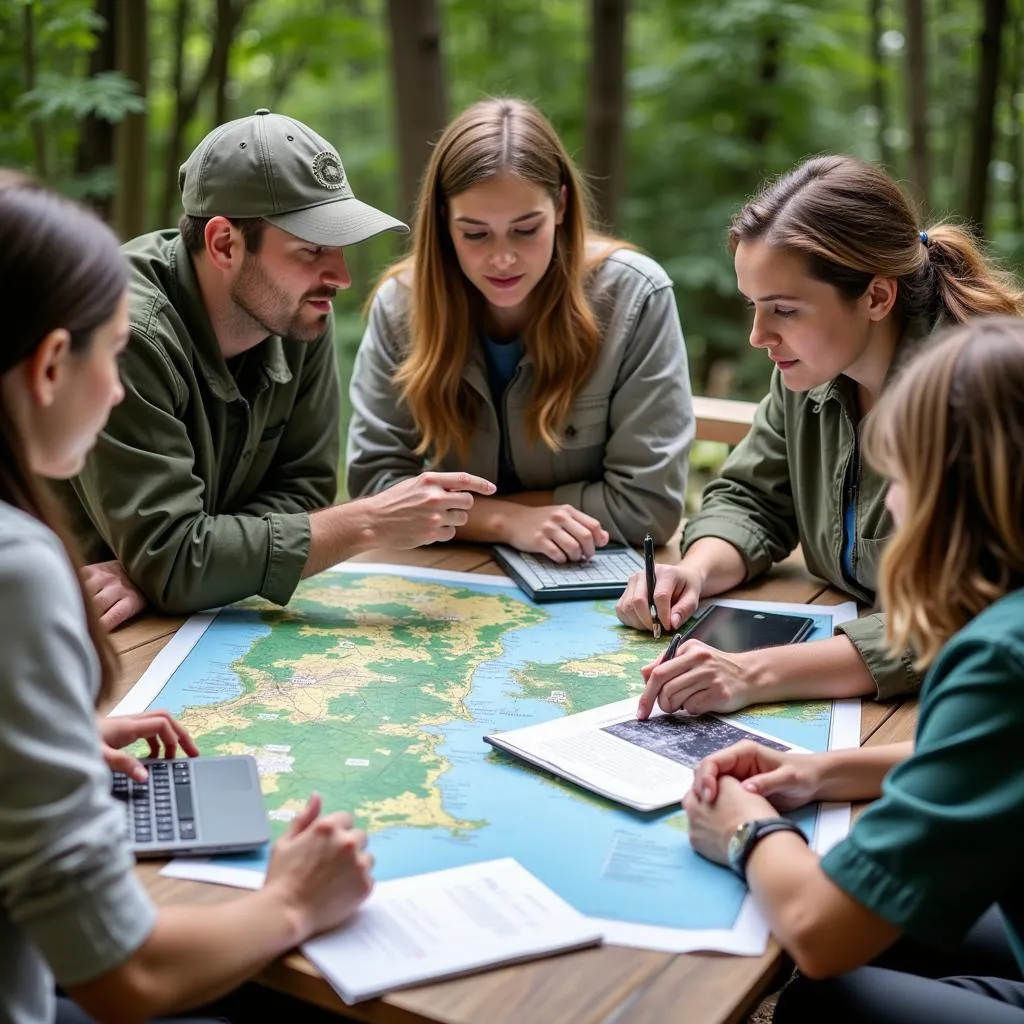Embarking on a career with a wildlife conservation society is more than just a job; it’s a commitment to protecting our planet’s precious biodiversity. If you’re passionate about wildlife and eager to contribute to their survival, exploring Wildlife Conservation Society Jobs might be your calling. This guide delves into the diverse opportunities available, the skills required, and how you can join the fight for a healthier planet.
Understanding the Landscape of Wildlife Conservation Society Jobs
Wildlife conservation societies are at the forefront of protecting endangered species, preserving vital habitats, and promoting harmonious coexistence between humans and wildlife. These organizations offer a wide array of career paths, catering to diverse skills and interests. Whether you’re a scientist, a communicator, or a field enthusiast, there’s a place for you in this critical mission.
What to Expect from a Career in Wildlife Conservation
Wildlife conservation society jobs are as diverse as the ecosystems they strive to protect. Here’s a glimpse into some common roles:
- Wildlife Biologists: These scientists conduct research to understand animal behavior, population dynamics, and threats to their survival. They play a crucial role in developing effective conservation strategies.
- Conservation Program Managers: Responsible for planning, implementing, and overseeing conservation projects, these professionals ensure initiatives are aligned with the organization’s goals and resources.
- Environmental Educators: Passionate about sharing their knowledge, environmental educators engage with the public, especially youth, to foster appreciation and support for conservation efforts.
- Wildlife Veterinarians: Providing specialized medical care to animals in the wild and captivity, these professionals contribute to the well-being of individual animals and the overall health of populations.
- Fundraising and Development Professionals: Securing funding is essential for any conservation organization. These individuals build relationships with donors, write grant proposals, and manage fundraising campaigns.
 Group of wildlife conservationists discussing strategies in a meeting
Group of wildlife conservationists discussing strategies in a meeting
Essential Skills for Wildlife Conservation Careers
While specific requirements vary depending on the role, certain skills are universally valued in the field of wildlife conservation:
- Strong Scientific Foundation: Understanding ecological principles, data analysis, and research methodologies is crucial for many positions within wildlife conservation societies.
- Passion for Wildlife and Conservation: A genuine commitment to protecting wildlife and their habitats is paramount. Your passion will fuel your dedication and drive in this challenging yet rewarding field.
- Communication and Interpersonal Skills: Whether you’re writing scientific reports, presenting research findings, or engaging with local communities, effective communication is essential.
- Problem-Solving and Adaptability: Conservation efforts often encounter unforeseen challenges. The ability to think critically, find creative solutions, and adapt to changing circumstances is invaluable.
- Teamwork and Collaboration: Conservation projects are rarely solo endeavors. The ability to collaborate effectively with a diverse team of scientists, policymakers, local communities, and other stakeholders is essential for success.
Finding and Securing Wildlife Conservation Society Jobs
- Online Job Boards: Websites dedicated to conservation careers, such as Conservation Careers and the Wildlife Society, regularly post job openings from various organizations.
- Organizational Websites: Directly explore the careers sections of reputable wildlife conservation societies like the World Wildlife Fund (WWF), The Nature Conservancy, and the Wildlife Conservation Society.
- Networking: Attend conferences, workshops, and webinars related to wildlife conservation. Networking provides valuable insights into available opportunities and helps you connect with professionals in the field.
 Wildlife biologist collecting data on a laptop in a forest setting
Wildlife biologist collecting data on a laptop in a forest setting
Tips for Standing Out as an Applicant
- Gain Relevant Experience: Volunteering, internships, and part-time jobs in related fields demonstrate your commitment and provide valuable hands-on experience.
- Develop Specialized Skills: Consider acquiring certifications in Geographic Information Systems (GIS), wildlife tracking, or environmental education to enhance your candidacy.
- Tailor Your Application: Carefully review job descriptions and highlight your skills and experiences that align with the specific requirements of each position.
- Showcase Your Passion: Let your enthusiasm for wildlife conservation shine through in your cover letter and during interviews. Share your experiences and what motivates you to make a difference.
Conclusion
Wildlife conservation society jobs offer a meaningful path for those driven to protect our planet’s biodiversity. By combining your passion for wildlife with the right skills and dedication, you can contribute to creating a future where both humans and wildlife thrive. Your journey towards a fulfilling conservation career begins with a single step. Explore the opportunities, embrace the challenges, and join the global movement to safeguard our planet’s precious wildlife for generations to come.
Frequently Asked Questions (FAQs)
Q: What qualifications do I need for a wildlife conservation job?
A: Qualifications vary greatly depending on the specific role. While some positions require advanced degrees (Master’s or Ph.D.) in fields like biology or ecology, others may prioritize experience and specialized skills.
Q: Are wildlife conservation jobs only for scientists?
A: Absolutely not! Wildlife conservation societies rely on a diverse workforce, including professionals in communications, education, fundraising, policy, and more.
Q: What are the typical working conditions in wildlife conservation?
A: Working conditions can range from offices to remote field locations. Be prepared for physically demanding tasks, exposure to various weather elements, and potential interactions with wildlife.
If you need further assistance, please contact us:
Phone Number: 02043854663
Email: [email protected]
Address: Khu 34, Bac Giang, 260000, Vietnam.
Our customer service team is available 24/7.